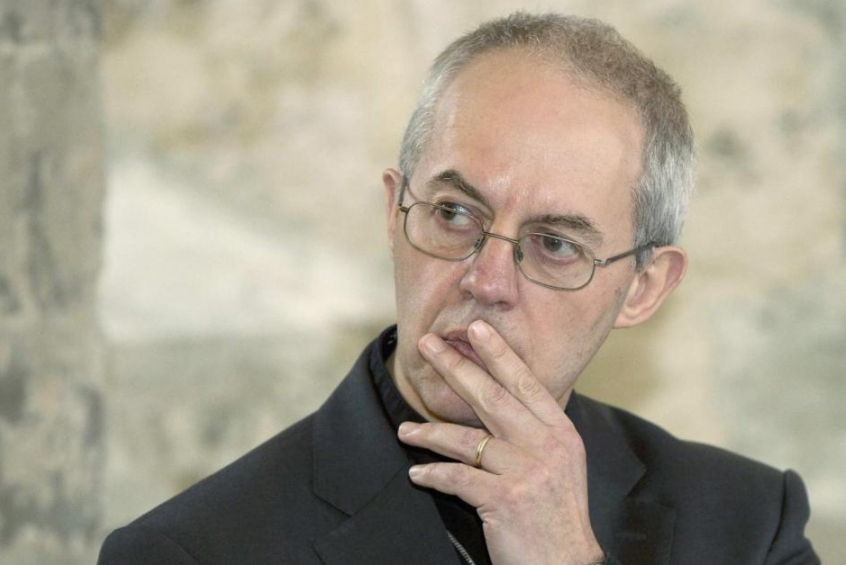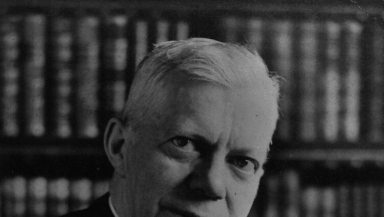The Archbishop of Canterbury, Justin Welby, has declined to rescind his statement that said Bishop George Bell still has a 'significant cloud' left over his name following the publication of a critical report into the Church of England's handling of an abuse claim against the late bishop.
The refusal by the Archbishop of Canterbury to change his position follows a letter sent to Lambeth Palace and the Daily Telegraph last week by seven eminent academics expressing their 'profound dismay' at the 'irresponsible and dangerous' statement, in which Archbishop Welby said of Bell that 'a significant cloud is left over his name'.
In a statement issued today, Welby referred back to the separate case of Peter Ball, the former bishop of Lewes and Gloucester, who was released from prison in February last year after serving 16 months for the grooming, sexual exploitation and abuse of 18 vulnerable young men who had sought spiritual guidance from him between 1977 and 1992.

A damning independent inquiry last year found that the CofE 'colluded' with the abuse 'rather than seeking to help those he had harmed'.
In new comments that risk angering supporters of Bishop Bell, Welby said today: 'The experience of discovering feet of clay in more than one person I held in profound respect has been personally tragic.'
The Church of England was criticised in the independent Carlile report published in December for a 'rush to judgment' in its handling of the allegations against Bishop Bell, the former Bishop of Chichester who died in 1958. The report by Lord Carlile said that although the Church acted in good faith, its processes were deficient and it failed to give proper consideration to the rights of the accused.
In today's statement, which Welby said reflected the 'considered, personal response' he has now sent the academics, the Archbishop said: 'I cannot with integrity rescind my statement made after the publication of Lord Carlile's review into how the Church handled the Bishop Bell case. I affirmed the extraordinary courage and achievement of Bishop Bell both before the war and during its course, while noting the Church has a duty to take seriously the allegation made against him.
'Our history over the last 70 years has revealed that the Church covered up, ignored or denied the reality of abuse on major occasions. I need only refer to the issues relating to Peter Ball to show an example. As a result, the Church is rightly facing intense and concentrated scrutiny (focused in part on the Diocese of Chichester) through the Independent Inquiry into Child Sexual Abuse (IICSA). Our first hearing is in March.
'The Diocese of Chichester was given legal advice to make a settlement based on the civil standard of proof, the balance of probability. It was not alleged that Bishop Bell was found to have abused on the criminal standard of proof, beyond reasonable doubt. The two standards should not be confused. It should be remembered that Carol, who brought the allegation, was sent away in 1995, and we have since apologised for this lamentable failure; a failure highlighted by Lord Carlile.
'I wrote my response with the support of both Bishop Peter Hancock, the lead bishop for safeguarding, and Bishop Martin Warner, the Bishop of Chichester. We are clear that we accept all but part of one of the recommendations Lord Carlile makes and we are extremely grateful to him for what he has done and the help he has given the church.
'He indicates that in his judgment, a better way to have handled the allegation would have been for the Church to offer money on condition of confidentiality. We disagree with this suggestion. The confidentiality would have been exposed through the IICSA process, and the first question we would have faced, both about Bishop Bell and more widely, would have been 'so what else are you concealing?'. The letter from the historians does not take into account any of these realities, nor the past failures of the Church. But we will go on considering how we can make our processes better and more robust, as pointed out by Lord Carlile.
'As in the case of Peter Ball, and others, it is often suggested that what is being alleged could not have been true, because the person writing knew the alleged abuser and is absolutely certain that it was impossible for them to have done what is alleged. As with Peter Ball this sometimes turns out to be untrue, not through their own fault or deceit but because abuse is often kept very secret. The experience of discovering feet of clay in more than one person I held in profound respect has been personally tragic. But as I said strongly in my original statement the complaint about Bishop Bell does not diminish the importance of his great achievements and he is one of the great Anglican heroes of the 20th century.'
The statement is in response to the letter by Prof Sir Ian Kershaw, one of the world's leading authorities on the Third Reich, Prof Charmian Brinson, Prof Andrew Chandler, Professor John Charmley, Prof Michael J Hughes, Prof Jeremy Noakes and Prof Keith Robbins.

They wrote: 'None of us may be considered natural critics of an Archbishop of Canterbury.
'But we must also draw a firm line. The statement of 15 December 2017 seems to us both irresponsible and dangerous.
'We therefore urge you, in all sincerity, to repudiate what you have said before more damage is done and thus to restore the esteem in which the high, historic office to which you have been called has been held.'
Before the allegations were made public by the Church of England, Bishop Bell was known as a highly revered theologian who was widely regarded as a hero for his work helping victims of Nazi persecution.
But in a statement following the Carlile report, Archbishop Welby left open the possibility that Bell was guilty, saying that he was 'accused of great wickedness' and apologised only 'for the failures of the process'.
In their letter to Welby, the historians – including two biographers of former Archbishops of Canterbury – said that they 'wish to express our profound dismay with the position you have taken'.
They wrote that the current Archbishop's position 'offends the most basic values and principles of historical understanding'.
They continued: 'The allegation [against Bell] is not only wholly uncorroborated but is contradicted by all the considerable, and available, circumstantial material which any historian would consider credible.
The letter went on: 'We cannot understand how such an unsupported, indeed insupportable, allegation can be upheld by a responsible public authority. Quite simply, it is indefensible.'
In his original statement, Welby had noted that Lord Carlile did not decide on guilt, but the academics pointed out he was deliberately prevented from doing so by the terms of reference that had been set out by the CofE.
They wrote: 'We state our position bluntly. There is no credible evidence at all that Bishop Bell was a paedophile.
'We state this after reviewing all that is known about his character and behaviour over many years.'
They concluded that Bell has been 'impugned from within his own Church of England', adding: 'There is today no cloud at all over Bishop Bell. Nobody employing credible critical method could think otherwise.'













